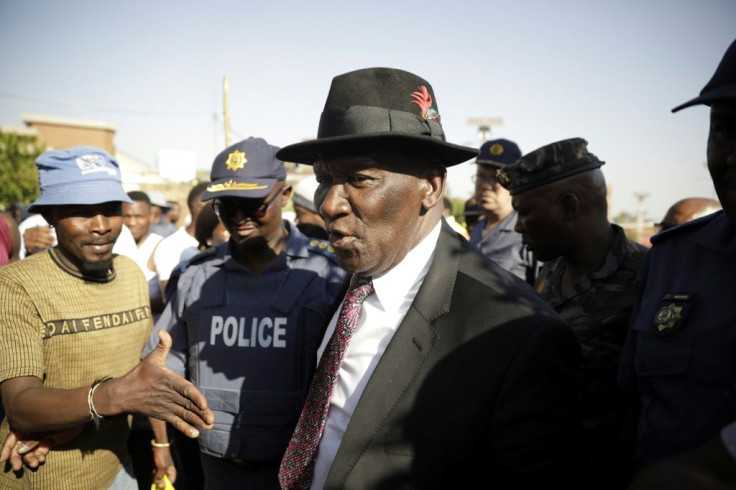SAfrica Crime Rate Drops, Minister Says Thanks To Virus Lockdown Booze Ban

South African Police Minister Bheki Cele sports a dark hat and pinstriped suit, a style that escapes no one in its echo of Eliot Ness, the famed enforcer of Prohibition in 1920s America.
The media-savvy police boss has been boasting of a dramatic fall in crime since South Africa imposed a 21-day coronavirus lockdown, along with a ban on the sale of booze.
In the first nine days of nationwide confinement, the tally of murders plummeted to 94 from 326 over the same period last year.
Reported rape cases fell to 101 from 699, while cases of grievous bodily harm declined eight-fold to 456 from 2,673.
Cele made no secret of his conclusion for the big fall: enforced sobriety.
"We attribute this to the non-availability of alcohol," he declared last weekend.
The pandemic appears indeed to have provided a respite for a country with one of the highest crime rates in the world.
Rival gang members in Cape Town's notorious Cape Flats have even temporarily halted their turf wars to deliver food supplies to struggling households during the lockdown.
But experts sound a word of caution: the dip, they say, is unlikely to last and alcohol is a complex factor in the equation.
A research consultant at the Pretoria-based Institute of Security Studies, Johan Burger, said more visible policing and fewer people on the streets have inevitably led to a reduction of some crimes, especially in public spaces.
But those with access to alcohol and living in small cramped homes typical of South Africa could find themselves in a dangerous cocktail that could almost guarantee confrontation, Burger said.
Conversely, those who suddenly cannot get alcohol experience frustration -- "and we know frustration is the phase before aggressive behaviour," Burger said.
Shaun Shelly, founder of an awareness programme called SA Drug Policy Week, said the alcohol ban was "purely a moral position" and there was insufficient evidence to prove it had the dampening effects on crime as claimed by Cele.
A sudden cut in supply of alcohol causes physical and mental problems, the South African National Council on Alcoholism and Drug Dependence warns.

Wine, beer and homemade alcohol made from maize, also called corn, are readily knocked back in South Africa.
The country ranks 30th in the world in terms of per capita alcohol consumption, according to 2010 figures by the World Health Organization (WHO).
But Cele has made no secret of his dream of a South Africa where booze is banned permanently.
"My first prize would be that we shut down alcohol," he said provocatively.
"I wish (the) alcohol ban could be extended beyond lockdown."
For good measure, he has added tobacco to his blacklisted lockdown commodities, saying they are non-essential and dangerous for health.
His zeal has unsurprisingly caused him to come under fire.
Andrew Whitfield, the shadow police minister for South Africa's main opposition Democratic Alliance party, lashed Cele for his visionary talk.
"I think the minister is overreaching and that the power has gone to (his) head," he said, warning against a drift towards an "authoritarian regime".
The response to Cele on social media has been caustic.
"Bheki Cele should go 21 days without a hat. Then he can lecture us about going 21 days without smoking," tweeted Roman Cabanac.
Some ironically pointed out that if Cele styled himself on the "incorruptible" Eliot Ness, he himself was fired from his post as police chief in 2012 on suspicion of graft.
The behaviour of a 31-year-old resident of Soweto, on the outskirts of Johannesburg, showed the contorted response of many South Africans to a boozeless lockdown.
"Yes, Cele is right -- crime has reduced in the neighbourhood," he told AFP... shortly after meeting with an illegal trader to score a black market 12-pack of beer.
The father of one, who spoke on condition of anonymity, said he felt justified in breaking the rules.
"We get bored, you can't wake up and not do anything every day."
© Copyright AFP {{Year}}. All rights reserved.





















